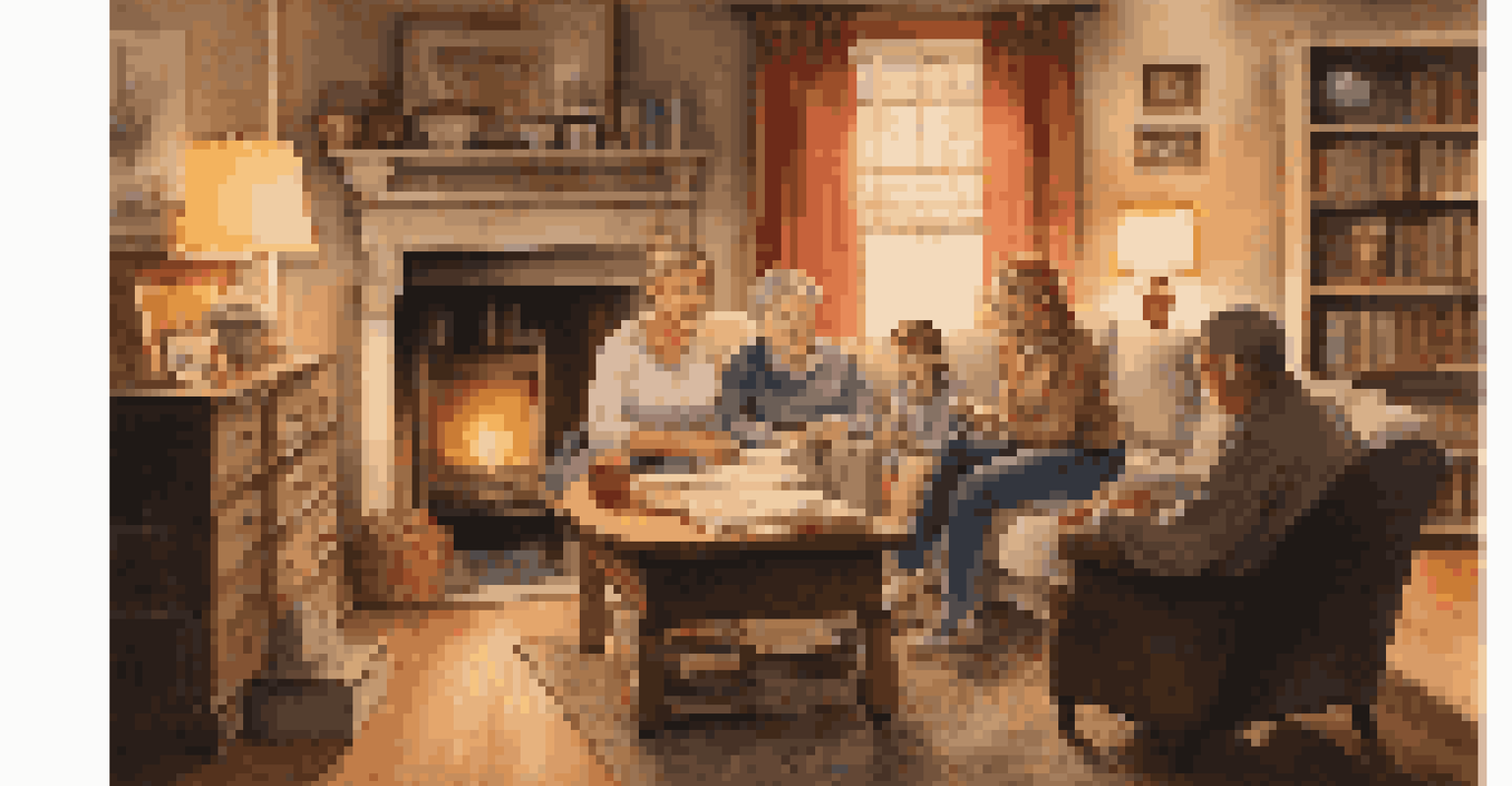Genealogy Research for the Non-Genealogist: Getting Started

Understanding Genealogy: What Is It and Why It Matters
Genealogy is the study of family history and lineage, tracing your ancestors and understanding where you come from. It’s not just about names and dates; it’s a way to connect with your roots and understand family dynamics over generations. By diving into genealogy, you can uncover fascinating stories and perhaps even a few surprises about your heritage.
Genealogy is not just about finding names and dates. It's about discovering the stories that connect us to our past.
Many people embark on genealogy research to learn more about family traditions, cultural backgrounds, or even to find lost relatives. It can be a rewarding journey that brings families closer together as stories of past generations are shared and celebrated. Plus, understanding your ancestry can provide insight into your identity and even your health.
In short, genealogy matters because it helps us understand our past, which ultimately shapes our present and future. Whether you're looking for personal fulfillment or simply satisfying your curiosity, genealogy can be a fulfilling adventure.
Getting Organized: Tools and Resources for Beginners
Before diving into the world of genealogy, it's essential to get organized. Start by gathering any existing family documents, photographs, and oral histories. This can include birth certificates, marriage licenses, or even a family tree drawn on a napkin. Having everything in one place will help you see what you already know and what you need to investigate further.

Next, consider using digital tools designed for genealogy research. Websites like Ancestry.com or MyHeritage provide user-friendly platforms for building family trees and accessing historical records. There are also free resources available, such as FamilySearch.org, which offers a wealth of information without any cost.
Genealogy Connects Us to Our Roots
Exploring genealogy helps us uncover our family history and understand our identity through shared stories and traditions.
Lastly, create a system for documenting your findings. Whether through spreadsheets, notebooks, or genealogy software, keeping track of your sources and discoveries will save you from future headaches. Organization is key to a successful research journey, so take the time to set this up right.
Starting Your Research: Where to Begin
A good starting point for your genealogy research is to interview family members. Ask them about their memories, stories, and any documents they might have. Often, family members can provide information that isn’t found in official records, making this a valuable first step in piecing together your family history.
The past is never dead. It’s not even past.
Once you’ve gathered information from your family, it’s time to explore public records. Birth, marriage, and death certificates, as well as census records, provide a wealth of information about your ancestors. Check local libraries, historical societies, or governmental websites to access these documents.
Don’t forget to use online databases! Many websites host extensive collections of records that can be searched by name or location. This can help you fill in gaps and connect the dots in your family history. Remember, every little detail counts!
Navigating Online Genealogy Databases Effectively
Online genealogy databases can be treasure troves of information, but they can also feel overwhelming. To navigate them effectively, start by familiarizing yourself with the search functions of the websites you choose. Many databases allow you to filter results by location, year, or type of document, which can streamline your search.
Be prepared for a mix of free and paid resources. While some sites offer free access to certain records, others may require a subscription. It's wise to take advantage of free trials or library access before committing financially. Many local libraries offer free access to popular genealogy sites, so don’t hesitate to ask.
Organization is Key for Research
Gathering documents and using digital tools effectively streamlines the genealogy research process.
Lastly, take notes as you research online. Document your findings along with the sources, as this will help you verify information later. Online research can be incredibly rewarding, but keeping organized notes will save you time and frustration in the long run.
Understanding Genealogy Terms: A Quick Glossary
As you dive deeper into genealogy, you’ll encounter specific terms that may seem confusing at first. For instance, ‘pedigree’ refers to a diagram that shows the lineage of an individual, while ‘descendant’ refers to a person who is descended from a particular ancestor. Familiarizing yourself with these terms will help you communicate more effectively with fellow researchers.
Another important term is ‘census,’ which is a periodic count of a population that collects demographic information. Census records are crucial for genealogy as they provide a snapshot of a family at a specific time. Understanding these terms can enhance your research and help you make sense of the documents you encounter.
Don't hesitate to keep a glossary handy as you research. This will not only clarify your understanding but also make you feel more confident as you engage with the genealogy community. Remember, everyone was a beginner once!
Connecting with the Genealogy Community for Support
One of the best ways to enhance your genealogy research is to connect with others who share your interest. Online forums, local genealogy clubs, and social media groups can offer invaluable support and resources. Engaging with the community allows you to share tips, ask questions, and even collaborate on research projects.
Don’t underestimate the power of genealogy conferences and workshops. These events often feature expert speakers and hands-on learning opportunities. Attending these gatherings can not only boost your skills but also expand your network of fellow enthusiasts who can help you on your journey.
Engage with the Genealogy Community
Connecting with others through forums and workshops enhances learning and provides support in your genealogy journey.
Remember, genealogy isn’t a solitary pursuit. Sharing your experiences and learning from others can make the process more enjoyable and less daunting. You might even discover new leads and insights that you wouldn’t have found on your own.
Preserving Your Findings: Sharing Your Family History
Once you've compiled a significant amount of research, it's time to think about how to preserve and share your findings. Creating a family history book can be a wonderful way to present your discoveries, complete with photos, stories, and documents. This allows you to share your family's legacy with future generations.
Additionally, consider digital preservation methods, such as scanning documents and photos to create a digital archive. This not only protects your findings from physical wear and tear but also makes them easily shareable with family members who live far away. Online platforms can help with this as well, allowing you to create family websites to showcase your research.

Finally, remember to keep updating your family history as you gather more information. Genealogy is an ongoing journey, and sharing your evolving story will keep your family connected to their roots. Celebrate your findings, and encourage others to join in on the exploration!